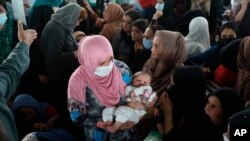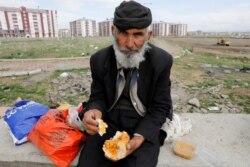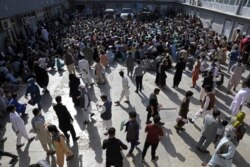Every day sees more Afghan refugees reach Turkey after a grueling trek across Iran. As far as they’re concerned their journey is far from over — they want to get to the countries of the European Union — for them the Promised Land.
But it is a land that is unwilling to accept them and is making plans to deter them from arriving.
Around 2,000 Afghans a day are entering Turkey, and migration experts expect the numbers to surge as the Taliban seizes control of more of Afghanistan.
The Taliban is currently besieging three major cities in south and west Afghanistan to add to the rapid rural gains it has made in recent weeks in the wake of the decision by the Biden administration to withdraw US troops from the country. Almost all NATO troops will be gone by September. Few observers believe the Afghan government will be able to hold out and last week a Pentagon watchdog warned that the country's government will likely face an “existential crisis.”
The Afghans making their way through Iran to Turkey are voting with their feet, fearful of what a Taliban future of strict Islamic rule will hold for them. Most arriving at the Turkish borders are single men, and many are uneducated, but hope to secure settlement in Europe and for their families to join them later, say migration groups.
Turkey the Gatekeeper
European leaders are preparing for a new migration crisis and are negotiating another multi-year migration deal with Turkey to get Ankara to block Afghan and other asylum-seekers from heading their way. It would be a renewal of a five-year deal struck in 2016 that saw the EU pay Ankara billions of dollars to curb irregular migration towards Europe, improve the living conditions of refugees in Turkey, and foster legal migration through official resettlement schemes.
“The 2016 agreement had a significant impact on limiting the number of arrivals” in the EU, according to Daniele Albanese of Caritas Italiana, a non-profit and the charitable arm of the Italian Bishops Conference. “While nearly 861.630 people reached Greece in 2015, that number dropped to 36, 310 the following year,” she noted in a commentary for the Italian Institute for International Political Studies, a think tank.
But she warns that a “political approach that does not take into consideration the needs of the refugee population deserving a better life is far from a long-term, durable solution.”
No repeat of 2015
For now, though, European governments are focused on the short-terms and are in no mood to see a return to the open-doors migration policy of 2015, one that in its wake roiled the continent’s politics and fueled the rise of populist nationalist parties. “Post-U.S. Afghanistan poses a severe migration problem, and we expect a rising number of people attempting to flee the Taliban,” a senior EU diplomat told VOA.
Around a million asylum-seekers from the Mideast, most of them Syrians, Afghanistan and sub-Saharan Africa arrived and settled in Europe in 2015-2016.
Asked last month at a press conference whether Germany should welcome Afghan refugees, German Chancellor Angela Merkel, the architect of the 2015 open-doors policy, replied: “We cannot solve all of these problems by taking everyone in.” She called instead for political negotiations so “people can live as peacefully as possible in the country.”
Greek authorities are reporting that Afghans now make up the largest share of asylum-seekers who manage to navigate the Aegean from Turkey. Austria last week announced it is to deploy additional soldiers to its borders with Slovenia and Hungary so as to increase the number of border guards by 40 percent. The country’s interior minister Karl Nehammer said at a news conference that EU migration policies have proven ineffective against irregular migrants, and he said Austrian immigration authorities have already apprehended 15,768 migrants attempting to cross illegally the Austrian border this year, compared to 21,700 for the whole of 2020.
“In Austria we have one of the biggest Afghan communities in the whole of Europe,” Nehammer said. “It cannot be the case that Austria and Germany have to solve the Afghanistan problem for the EU,” Nehammer added.
Despite the advance of the Taliban, European countries have been continuing with deportations of Afghan asylum-seekers — only Finland, Sweden and Norway have announced temporary suspensions of forced returns to Afghanistan.
Turkey is already hosting anywhere from an estimated 200,000 to 600,000 Afghans and - unlike the more than three million Syrian refugees living in Turkey - they have few legal rights of protection and no access to public services. Turkish opposition parties have been seizing on migration as an issue to try to outmaneuver President Recep Tayyip Erdoğan and last month jumped on remarks by Austrian Chancellor Sebastian Kurz that Turkey is “a more suitable place” for Afghans than his or other western European countries.
On Sunday, Devlet Bahçeli, chairman of the Nationalist Movement Party, MHP, told the Türkgün newspaper “there should be a limit on asylum seekers from going and settling wherever they want without the control [of authorities].”
“It’s understood that an influx of refugees will reach our borders in the risky and dangerous period ahead. We must be on the alert,” he added.






